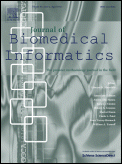
JOURNAL OF BIOMEDICAL INFORMATICS
Scope & Guideline
Transforming biomedical research with cutting-edge informatics.
Introduction
Aims and Scopes
- Biomedical Data Mining and Analysis:
The journal emphasizes the use of data mining techniques to extract meaningful insights from large-scale biomedical datasets, including electronic health records (EHRs), genomic data, and clinical trial data. - Machine Learning and Artificial Intelligence in Healthcare:
A core focus is on the application of machine learning and AI methods to improve clinical decision-making, disease prediction, and personalized medicine, reflecting the rapid advancements in these technologies. - Natural Language Processing (NLP) for Clinical Text:
The journal covers innovative approaches in NLP to process and analyze clinical narratives, facilitating the extraction of relevant information for various health applications. - Health Informatics and Clinical Decision Support Systems:
Research on the design and evaluation of systems that support clinical decision-making through the integration of evidence-based guidelines and patient data is a significant scope. - Interoperability and Data Standards:
The journal addresses the challenges of interoperability in health information systems, advocating for standardized data models like FHIR to enable better data sharing and collaboration. - Ethics and Fairness in Biomedical AI:
There is a growing emphasis on the ethical implications of AI in healthcare, including bias mitigation, fairness in predictive modeling, and the responsible use of patient data. - Multimodal and Federated Learning Approaches:
The journal explores the integration of various data types (e.g., genomic, clinical, imaging) and the use of federated learning to analyze data across institutions while preserving privacy.
Trending and Emerging
- Integration of AI with Clinical Practices:
There is a notable increase in research integrating AI technologies directly into clinical workflows, focusing on how these systems can enhance patient care and decision-making. - Use of Generative AI and Language Models:
Recent publications highlight the use of generative AI models, such as GPT, for tasks like clinical note summarization, drug discovery, and enhancing patient engagement through conversational agents. - Focus on Health Equity and Social Determinants of Health:
Emerging themes include research addressing health disparities and the role of social determinants in patient outcomes, advocating for more equitable healthcare solutions. - Privacy-Preserving Data Sharing Techniques:
With growing concerns over data privacy, there is an increasing focus on federated learning and other privacy-preserving techniques that allow for collaborative research without compromising patient confidentiality. - Real-World Data Utilization:
An upward trend is seen in studies leveraging real-world data for clinical research, particularly in understanding treatment outcomes and patient experiences in diverse populations. - Ethics and Governance in AI Applications:
Research addressing the ethical implications and governance of AI in healthcare is gaining traction, with a focus on developing frameworks to ensure responsible AI usage. - Multimodal Data Integration:
The integration of diverse data types, such as clinical, genomic, imaging, and social media data, is becoming increasingly prevalent, reflecting a trend towards holistic patient analysis.
Declining or Waning
- Traditional Statistical Methods:
There appears to be a waning interest in conventional statistical methods in favor of more complex machine learning and deep learning approaches, which dominate recent publications. - General Reviews and Surveys:
While foundational reviews were previously common, the journal now favors original research articles that present new methodologies or applications, leading to a decline in the publication of general review papers. - Single-Modal Studies:
Research focusing solely on one type of data modality (e.g., only clinical or only genomic) is decreasing as the field moves towards more integrated, multimodal approaches. - Basic Informatics Frameworks:
The publication of papers discussing basic informatics frameworks or theoretical models is declining as the focus shifts towards practical applications and implementations in real-world settings. - Limited Focus on Legacy Systems:
There is less emphasis on legacy health information systems as the field progresses towards modern, interoperable solutions and the adoption of cloud-based technologies.
Similar Journals
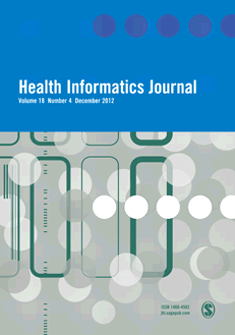
Health Informatics Journal
Transforming health delivery with cutting-edge research.Health Informatics Journal, published by SAGE Publications Inc., serves as a premier platform for research and discussion in the dynamic field of health informatics since its inception in 1995. With an impressive Q2 ranking in the Health Informatics category and a notable 77th percentile ranking in the Scopus database, this journal provides an essential resource for academics and professionals alike. The journal's transition to Open Access since 2020 has further broadened its reach, ensuring that innovative research is accessible to a global audience. Covering a wide range of topics within health informatics, the journal aims to foster high-quality scholarly communication and facilitate the dissemination of cutting-edge insights that can help advance health care delivery and patient outcomes. With an ongoing commitment to excellence, the Health Informatics Journal is dedicated to enhancing the intersection of technology and healthcare through rigorous research and collaborative exploration.
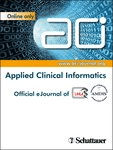
Applied Clinical Informatics
Exploring the future of healthcare through applied informatics.Applied Clinical Informatics is a leading journal dedicated to the expanding field of health informatics and its applications within clinical settings. Published by GEORG THIEME VERLAG KG in Germany, this journal serves as a pivotal platform for researchers and professionals engaged in the integration of technology and healthcare, aiming to improve patient outcomes through innovative informatics solutions. With a solid Q2 ranking in multiple disciplines including Computer Science Applications, Health Informatics, and Health Information Management, it reflects its prominent position in the academic landscape. The journal provides accessible content while fostering dialogue on key issues and advancements in clinical informatics. Covering a wide array of topics from data management to e-health applications, Applied Clinical Informatics is essential reading for those looking to stay attuned to the latest research and developments from 2009 to 2024, enriching the knowledge base of students, professionals, and researchers worldwide.
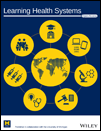
Learning Health Systems
Innovating the intersection of health and technology.Learning Health Systems is a premier open access journal published by WILEY that has been at the forefront of innovation in the fields of Health Informatics, Health Information Management, and Public Health since its inception in 2016. With a dedicated focus on the intersection of clinical practice and health technology, this journal is pivotal for researchers, professionals, and students seeking to advance the knowledge base in these critical areas. The journal enjoys a robust reputation, boasting a Q1 ranking in multiple categories as of 2023, and ranking within the top percentiles in both Medicine and Health Professions across various metrics. Designed to foster collaboration and dissemination of cutting-edge research, Learning Health Systems is committed to bridging gaps between data science and practical health applications while providing an accessible platform for transformative ideas. It invites contributions that challenge existing paradigms and promote innovative solutions that enhance healthcare delivery and patient outcomes.

BMC Medical Informatics and Decision Making
Advancing healthcare through innovative informatics.BMC Medical Informatics and Decision Making is a leading journal in the fields of medical informatics and health policy, published by BMC since its inception in 2001. With an impressive impact factor reflecting its status as a Q1 journal in both Computer Science Applications and Health Informatics, it serves as a vital resource for researchers, professionals, and students dedicated to advancing healthcare through informatics. The journal is committed to disseminating high-quality, peer-reviewed research focused on the innovative use of information technology in healthcare, decision-making processes, and policy formulation. As an Open Access platform, it ensures that findings are widely accessible and can foster collaboration across various disciplines. Positioned at the cutting edge of health informatics, BMC Medical Informatics and Decision Making aims to influence practice and inspire new research directions, making it an essential publication for anyone involved in improving health systems worldwide.

JMIR Medical Informatics
Unlocking the Potential of Medical Data for Better OutcomesJMIR Medical Informatics is a leading open access journal dedicated to the field of medical informatics, published by JMIR Publications, Inc. since 2013 in Canada. With an impressive impact factor and a distinguished Q2 ranking in both Health Informatics and Health Information Management categories, this journal plays a pivotal role in disseminating cutting-edge research and innovative practices. Covering a wide scope that includes clinical informatics, health information systems, and data analytics, JMIR Medical Informatics provides valuable insights for researchers, practitioners, and policymakers alike. The journal is accessible to a global audience, ensuring that pioneering studies and methodologies reach those who can apply them to enhance health outcomes. With its commitment to advancing the body of knowledge in medical informatics, this journal stands as a vital resource for anyone involved in or studying the intersection of healthcare and technology.
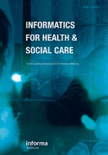
Informatics for Health & Social Care
Innovating practices for better health outcomes.Informatics for Health & Social Care is a leading journal published by Taylor & Francis Inc, dedicated to the intersection of health informatics and social care. With a strong emphasis on advancing knowledge in the fields of health information management and nursing, this journal has established itself as a vital resource for researchers and professionals seeking to explore innovative applications of informatics to improve patient outcomes and streamline healthcare delivery. Recognized for its influential contributions, it currently holds a Q2 ranking in both Health Informatics and Health Information Management, as well as a prestigious Q1 ranking in Nursing (miscellaneous) for 2023, signifying its critical role within the academic community. The journal is accessible for open access viewing, fostering a broader dissemination of research findings. Released continuously since 1976, it stands as a testament to the evolving landscape of health informatics, addressing pertinent issues and facilitating discussions that shape practices in health and social care delivery.

Journal of Healthcare Informatics Research
Fostering innovation in healthcare through information technology.The Journal of Healthcare Informatics Research, published by SPRINGERNATURE, serves as a premier platform for the dissemination of innovative research and insights at the intersection of healthcare and information technology. Established in 2017 and operating out of Switzerland, this journal covers a broad scope encompassing Artificial Intelligence, Computer Science Applications, Health Informatics, and Information Systems, achieving a Q1 ranking across these fields in 2023. Notably, it ranks impressively within Scopus, holding positions in the top percentages across various categories, including 12th in Health Informatics. With an unwavering commitment to fostering advancements in healthcare through informatics, this journal is designed for researchers, professionals, and students alike, providing open access to significant findings and methodologies that drive the future of health technology. As the field evolves, the Journal of Healthcare Informatics Research stands as a vital resource for those dedicated to improving patient outcomes and operational efficiencies through data-driven strategies.

TECHNOLOGY AND HEALTH CARE
Transforming Healthcare with Cutting-Edge SolutionsTECHNOLOGY AND HEALTH CARE, published by IOS PRESS, stands as a prominent interdisciplinary journal dedicated to the integration of technology within the healthcare sector. With an ISSN of 0928-7329 and an E-ISSN of 1878-7401, this journal has been a vital resource since its inception in 1993, providing insights and advancements in various categories including bioengineering, biomedical engineering, health informatics, and more. Though it currently holds a Q4 classification in several fields and Q3 in others, it actively contributes to the dialogue surrounding innovative methodologies and practices that enhance healthcare delivery. Researchers, professionals, and students will find the journal invaluable for its diverse range of studies that explore the convergence of technology and health. Its commitment to fostering impactful research continues to reinforce its relevance in the evolving landscape of healthcare technology.

Journal of Medical Signals & Sensors
Pioneering Innovations in Biomedical EngineeringJournal of Medical Signals & Sensors, published by Wolters Kluwer Medknow Publications, is a pioneering platform in the fields of Biomedical Engineering, Computer Science, and Health Informatics, focusing on innovative research and advancements in medical technology. With an Open Access policy since 2012, the journal promotes widespread dissemination of knowledge, aiming to facilitate the sharing of vital insights and developments among researchers, healthcare professionals, and students globally. The journal has achieved commendable rankings in its various categories, including Q3 in Biomedical Engineering and Radiology, underscoring its importance in advancing health technology and informatics. Its commitment to rigorous peer review ensures that published works are of the highest quality, making it a valuable resource for those engaged in cutting-edge medical research. With annual publications planned through 2024, the Journal of Medical Signals & Sensors continues to expand its influence and relevance in a rapidly evolving scientific landscape.
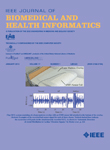
IEEE Journal of Biomedical and Health Informatics
Advancing the Intersection of Technology and HealthcareIEEE Journal of Biomedical and Health Informatics is a premier publication dedicated to advancing the field of biomedical and health informatics. Published by the esteemed IEEE-Inst Electrical Electronics Engineers Inc, this journal boasts a notable impact within various disciplines, ranking in the top quartile (Q1) across key categories such as Biotechnology, Computer Science Applications, Electrical and Electronic Engineering, Health Informatics, and Health Information Management as of 2023. With a strong Scopus ranking—placing it at #11 in Health Informatics and #6 in Health Information Management—it serves as a vital resource for cutting-edge research and innovative practices. Open Access options enhance accessibility, fostering collaboration among researchers, professionals, and students. Since its inception in 2013, the journal has been committed to publishing high-quality, peer-reviewed articles that explore the pivotal intersection between technology and healthcare, thereby contributing significantly to the evolution of medical practices and patient care.